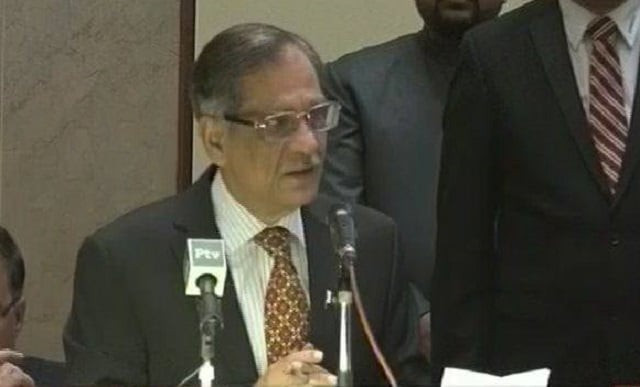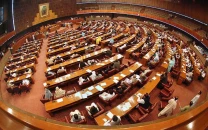CJP wonders if convicted party chief can run affairs from jail
Questions if a person who ridicules the judiciary be allowed to become a party head

The Chief Justice of Pakistan Saqib Nisar
PHOTO: FILE
Babar Awan, counsel for Pakistan Tehreek-i- Insaf (PTI) chief Imran Khan, had based much of his case for disqualifying Nawaz Sharif as party head on the language of the Article, but the chief justice rejected his contention, saying that the case does not fall under the article “at any stretch”.
Article 6 refers to high treason.
The chief justice did, however, note the counsel’s arguments about the applicability of Article 5. The CJP observed that the judges understood Awan’s argument that loyalty to the state means loyalty to the judiciary and if someone ridicules the judiciary, he is not loyal to the state.
SC gives Daniyal Aziz ten days to engage counsel in contempt case
A day earlier, referring to Article 5, the CJP had observed that ridiculing the judiciary was like disobeying the Constitution of Pakistan. “Loyalty to the state means loyalty to its basic organs, including the judiciary. Likewise, breaching of loyalty with state institutions will be disobedience to the Constitution,” the CJP said on Wednesday, while heading a three-judge bench that was hearing different petitions against the Election Act 2017.
During the hearing on Thursday, the bench asked PTI lawyer Babar Awan, if someone sentenced to life imprisonment could remain party head. The CJP also noted that Pakistan Muslim League Nawaz (PML-N)’s constitution gives immense power to the party head.
He then questioned whether or not a person being party head could run its affairs from behind bars.
When Awan cited judgments to substantiate his case, the CJP asked him whether any law made by parliament can be struck down on the basis of a judge’ opinion. Likewise, is there any judgment, wherein a law has been struck down on a person-specific or mala fide basis, he added.
The CJP said that parliament is the supreme law-making body, but if it makes a bad law, there is need to establish this as a fact through constitutional provisions.
Awan said the law was designed to benefit one individual. He said party heads are very important with regard to registration of a party and intra-party elections. Even party head has the authority to issue tickets to candidates, he added.
Awan claimed that the PML-N made amendments to the bill after the Panama Papers judgment, adding that change was made in Section 203 in the initial draft prepared by Electoral Reforms Committee in December 2016 and it remained on the National Assembly website but nobody raised objection to it.
Judges misconduct: SJC decides recording evidences
Disqualification term
Meanwhile, giving his arguments regarding the interpretation of the Article 62 (1) (f) of the Constitution, disqualified PTI parliamentarian Rae Hassan Nawaz’s counsel Asma Jahangir contended that disqualification under Article 62 (1) (f) of the Constitution should not be for more than five years.
She urged the court that instead of setting parameters for the word “sagacious”, they should leave decisions about who is sagacious and who is not up to voters, adding that if the court will give guidance through its judgment, it will be considered a ‘controlled democracy’. The counsel also questioned how the court can define ‘Ideology of Pakistan’, which is also mentioned in the Constitution.
When Justice Azmat Saeed Sheikh asked whether she wants the court to declare these provisions void, Jahangir said that the court should not declare them void, but it should avoid adjudicating on matters of a political nature and leaving them to future parliamentarians.
When Justice Ijazul Ahsan asked why parliament did not make amendments to these constitutional provisions, the counsel replied that parliament has yet to become independent. However, the chief justice said that they cannot use such words for parliament. Jahangir said that Elective Bodies Disqualification Order was introduced in 1960 and more than 7,000 people faced cases on the basis of it, adding that no one was disqualified from the 1985 National Assembly – during the Ziaul Haq regime.
During the hearing, the bench also observed that the terms used in Article 62 (1) (f) are vague. It also asked how the effects of the declaration under the article may be ended. Jahangir also said that the court’s judgments on the applicability of the article are conflicting.
The larger bench will resume hearing on Monday when the attorney general for Pakistan will argue the case.



















COMMENTS
Comments are moderated and generally will be posted if they are on-topic and not abusive.
For more information, please see our Comments FAQ